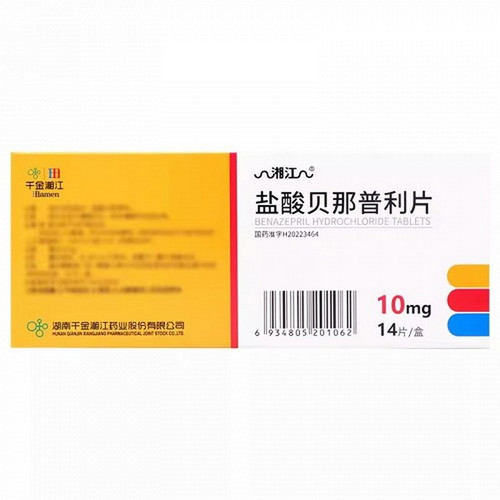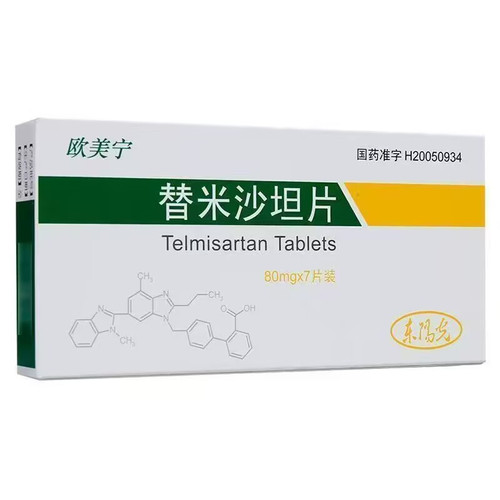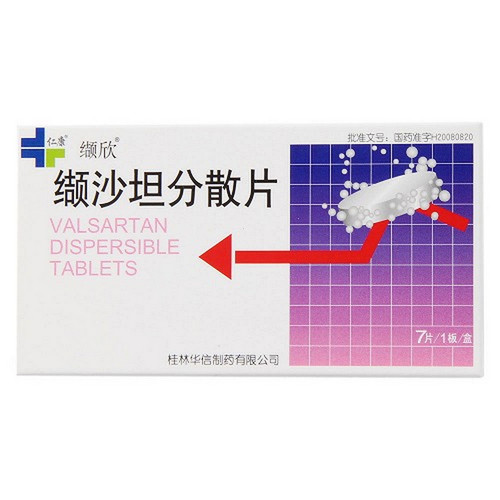Product Overview
[Drug Name]
Generic Name: Valsartan Capsules
Trade Name: TiTanWen Valsartan Capsules 80mg*7 Capsules
Pinyin Full Code: TiTanWen ZuoShaTanJiaoNang 80mg*7Li
[Main Ingredient]
The main ingredient of this product is valsartan.
[Properties]
This product consists of white or off-white granules and powder.
[Indications/Main Functions]
Treatment of mild to moderate essential hypertension.
[Specifications]
80mg*7 Capsules (TiTanWen)
[Dosage and Administration]
The recommended dose is 80mg once daily, regardless of gender, age, or race. The antihypertensive effect appears within 2 weeks, with maximum effect achieved after 4 weeks. For patients with inadequately controlled blood pressure, the daily dose can be increased to 160mg or a diuretic can be added. This drug can be used in combination with other antihypertensive agents. No dose adjustment is required for patients with mild to moderate renal impairment or non-biliary or non-cholestatic hepatic insufficiency. No dose adjustment is required for elderly patients. Safety and efficacy data for pediatric patients are not available. This drug reduces blood pressure in patients with hypertension without affecting heart rate. Abrupt discontinuation of this drug does not result in rebound blood pressure or other clinical adverse reactions. Multiple doses of this drug have no significant effect on total cholesterol, fasting triglycerides, fasting blood glucose, or uric acid.
[Adverse Reactions]
Adverse reactions are rare, mild, and transient: 1. Mild headache, dizziness, fatigue, abdominal pain, dry cough, and postural blood pressure changes are rare. 2. Increased potassium, decreased neutrophils, decreased hemoglobin and hematocrit, increased serum creatinine, and increased transaminases are rare. 3. There have been reports of adverse reactions such as diarrhea, rhinitis, pharyngitis, joint pain, and nausea.
[Contraindications]
This product is contraindicated in patients with allergies and in pregnant women.
Drug Interactions
Clinical trials have not revealed any clinically significant interactions between this drug and the following drugs: cimetidine, warfarin, furosemide, digoxin, atenolol, indomethacin, hydrochlorothiazide, amlodipine, and glyburide. This drug generally has no clinically significant interactions with metabolic inducers or inhibitors of the cytochrome P450 enzyme system. In vitro studies have shown no interactions with other drugs with high plasma protein binding, such as dimethoate, furosemide, and warfarin.
Concomitant use with potassium-sparing diuretics (e.g., spironolactone, triamterene, amiloride), potassium preparations, or potassium-containing salt substitutes may increase serum potassium. If coadministration is necessary, monitor carefully.
Precautions
1. Prevent hypotension in patients with abnormal blood volume and electrolytes. 2. Use with caution in lactating women. 3. Use with caution in patients with severe hepatic or renal impairment.
[Pediatric Use]
Unknown
[Elderly Use]
Although systemic effects of valsartan may be more pronounced in the elderly than in younger patients, these effects are not clinically significant.
[Overdose]
The primary symptom of an overdose is marked hypotension. If the condition occurs shortly after administration, vomiting may be initiated. Otherwise, standard treatment with intravenous saline infusion is recommended. Hemodialysis does not appear to be effective in clearing valsartan.
[Pharmacology and Toxicology]
This drug is an antagonist of the angiotensin I (AngI) receptor AT1. It selectively blocks the binding of AngI to the AT1 receptor, inhibiting vasoconstriction and aldosterone release, resulting in a hypotensive effect.









